So let's talk about a different one now, because naturally folks are, okay guys, I get it. You've talked about factor investing, and I get it that you talked about dividend investing, but I'm well read, and I exist out there on the forums, and I've heard about a thing. I think it's a great solution for me, and I want to know what are your takes on this thing that was popularized in the forum called the three-fund portfolio. Quite simply, a three-fund portfolio is typically comprised of a domestic total market fund, an international total market fund, and a bond total market fund, three broad asset categories. You buy different proportions based on where you are, set and forget it, and that's what you do. What do you think about the three-fund portfolio?
You know what's interesting is this is kind of like lazy investing, and we've done shows called "Lazy Investors Win," and so forth. So once again, we're not against this strategy either. I do think though that this is bumping right into when we talk about just we love index funds, and you mentioned this is kind of original from Bogleheads, which is synonymous with Vanguard Investments. People will get so excited about this, but there are still a lot of things that are missing on this. It's because just because you just gave out three things, you gave out domestic, you gave out international, and you gave out bonds, yep. When I was doing research for today's show, it cracked me up because I have not seen somebody trying to say this is what you ought to use on one of the blogs. Somebody was trying to give insight on how you figure out how much bonds you should have in your portfolio, and they brought up the age. You know, a way where you can, the older you get, obviously, the more bonds, but it still could way overstate how much bond you have, and it's the complexity of how much large-cap, how much international, how much bonds. There's still a lot of question marks about that. This is simple, but it doesn't actually help you with the complete execution because you have to figure out how much you're going to allocate to these three low-cost investments.
That's exactly right. We love that a three-fund portfolio in its simple construction is low cost because they're index funds, it can likely be super tax-efficient, although not the most tax-efficient. I'd argue there are other more tax-efficient ways to do the three-fund, and it doesn't involve stock picking. You're not having to go out there and pick winners and losers if you are doing index investing. However, you still have to make some decisions when it comes to the three-fund portfolio. You have to decide, okay, how much do I like fixed income, how much do I like total domestic, how much do I like total international? And psychologically, you have to have the staying power if you come through a decade where maybe international underperformed or it wasn't, how do you fight the emotion of saying, oh man, that one's been a dog. I'm going to get out of that. And then do you not just find yourself in the place where now you're just trying to time it? Okay, well, what's going to be the hot asset class for the next year, two years, five years, ten years, and which one should I avoid? And you start squeezing the balloon inappropriately. That's why we think rather than the three-fund portfolio, we think there's a better solution for folks that are in that stage of their investing career.
Yeah, I mean, well, it gets back to, we've-- you've heard us, I mean, because we go through the progression. When we-- we love index investing because it's low-cost, it's tax-efficient, there's a lot to be cheered on. But we know that that only gives you the 'what.' You go out there and look at index funds, but then how much do you badge each thing? And you're like, well, that depends upon your age, that depends upon your goals, there are so many risk factors that go into it. So when Target Retirement funds came on the scene, because when I hear about the three-fund portfolio, Fidelity forever had when that-- because I loved index investing, and then Fidelity had the Form One Index, right? That was like-- because this is before Target Retirement funds kind of started getting traction, and I sent a lot of people to that type of simple investment. But the problem is, it didn't rebalance, it didn't give any difference between a 25-year-old who bought it versus a 48-year-old who bought it. And then here comes Index Target Retirement funds. Now, you trolls, I said Index Target Retirement funds because I still want to get that tax efficiency, I want to get that low cost, but I love the simplicity of just saying, how much can you save? When do you need it? And then this does everything else for you because we all know that your investment path is going to change when you're 25, your needs are different than when you're 60. And that's what we're talking about when we say that that difference exists, is what's called your Glide path. Both that talk about-- we put up a slide. This is from Schwab, but this does exactly what we just did, what I just explained. Yeah, rather than you having to make the allocation decisions, or really, really good Target Retirement Index Fund will make the allocation decisions for you, really aggressive while you're young, and then it'll get naturally more conservative as you age. Now, we get people all the time; they get all caught up in this, 'oh, I don't like Target Retirement funds. I don't like the Target Index funds.' This is not supposed to be your end-all, be-all investment solution. This is supposed to be your start. We recommend utilizing these types of investments until your portfolio hits critical mass. When your portfolio hits critical mass, rather than a generalized solution, that's what we consider this. This is a general solution for a general population of people that are starting to invest. Once it's critical mass, we think it makes sense to move to a specialized solution, a portfolio designed for you, for your circumstance. It takes into account your risk tolerance, your risk capacity, your time horizon, your account structure, your savings goals, all of the unique factors that pertain to you specifically. But until you get to that point, we think your number one focus should be, how much can I save? How can I put more dollars in? How can I get my money working? And ignore the noise that doesn't matter at that part of your journey. Well, yeah, because what's going to create the easiest habit for you or the simple habit is something that makes inevitable wealth and makes it easy, it makes it attainable, and that's what I do like about Index Target Retirement funds is that you just, you take away so much of the decision making to where you now focus on, how can I save more? And how can I save faster to get through this get wealthy phase?
Find out how much wealth you need, when you’ll get there, and ways to speed the process. Own your time with the
Know Your Number course!













